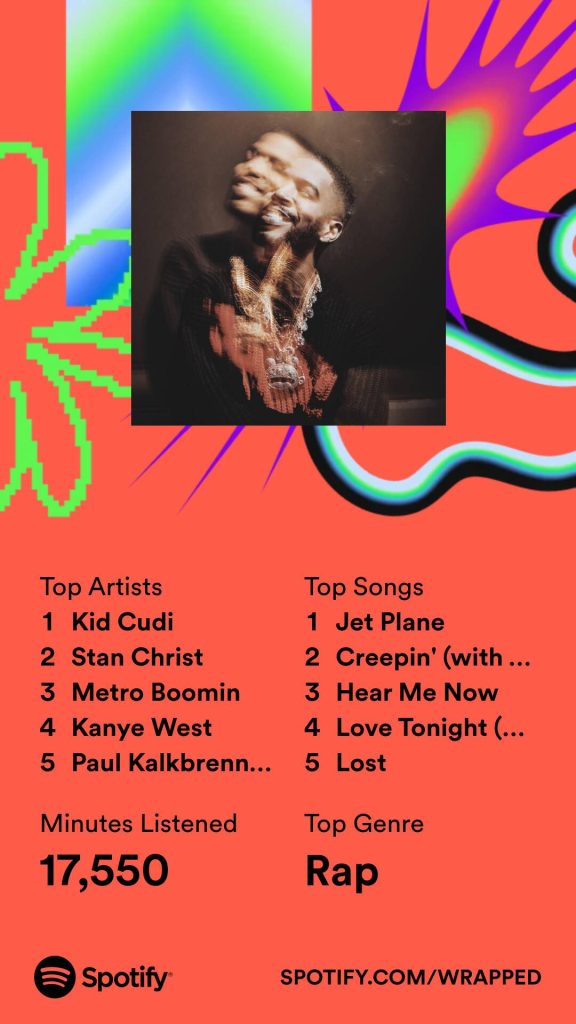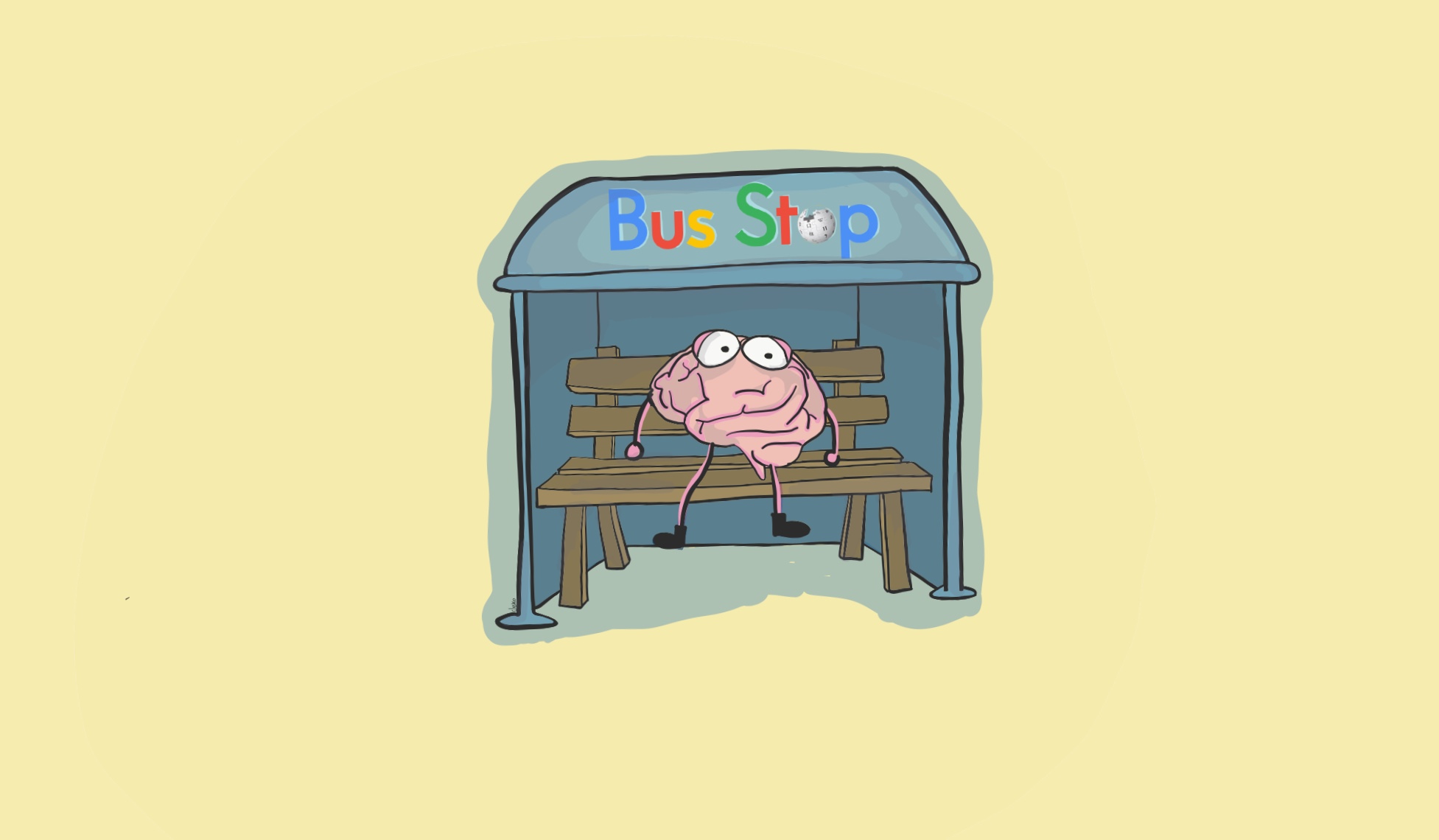It arrives in the beginning of December and takes over my entire Instagram story feed and rest of social media for three days: Spotify Wrapped. Every year Spotify gives their users a summarization of their listening behaviour in the past year. This includes things likes time listened, most listened songs and artists, time listened in certain months etc. etc. This is all put together in a fun and shiny overview, and comes with all kinds of playlists. It is also very easily shareable on social media, which a lot of people also do. I have always quite enjoyed the Spotify Wrapped myself, and I have even created a separate Spotify account from my parents to get a more personal Spotify Wrapped. But a few days after this years Wrapped I saw this tweet:
I thought this was quite a funny way to look at it, and maybe a bit concerning. This tweet had me thinking a lot more about what Spotify Wrapped does to our listening behaviour, and what happens to all the data in this Wrapped.
Online identity
First of all, I think that for a lot of people their wrapped can mean a lot for their online identity. It is a way to show off what your taste in music is, and even what kind of a person you are. Due to the Spotify Wrapped becoming such a big trend, it has become almost mandatory to post your Spotify Wrapped. And this really has impact on how people see their own online identity, and people really care about what other people think. I have heard people complain about what they had in their Wrapped, as if they had not listened to that music themselves. Apparently they would think this doesn’t fit the online identity that they have created for themselves. I also saw this in this tweet:
It can even go as far as people changing their listening habits due to the Spotify Wrapped. I have found myself doing this, after I had songs in my top songs which I was not happy about. When I listened to a song a lot, I thought by myself: “Oh maybe I should stop listening to this or else it will end up in my wrapped”. I found people experiencing this in a even more extreme manner, as in this reddit post where someone talks about not being able to listen to music freely. (5)

Creepy data collection
Then there is the part of the data collection. Because actually, Spotify Wrapped is no more than a very successful way of rebranding the fact that Spotify users are under constant surveillance. A lot of other companies are currently receiving backlash about tracking users and storing their data, while Spotify has mostly avoided this. A lot of users are even very happy with the arrival and existence of Spotify Wrapped. And this while Spotify is not really doing something different, they are just really good at rebranding it to be fun.
Spotify is very good at making such lists as Wrapped, and giving song recommendations and making personalized playlists. This is due to their very good artificial intelligence system and an enormous data base. They also use this data for personalised ads for example. And this data is not just data about songs, because this data also says a lot about the users’ tastes, moods and habits, and this is quite sensitive data. While Spotify doesn’t sell this data, they do store this data for a very long time, mostly until the account is deleted. (1) Quite scary if you ask me…
Enormous advantages (for Spotify)
What makes it even weirder is that Spotify gets enormous competitive advantage from collecting the users data. When they post their yearly Spotify Wrapped, it gets posted all over social media for days in a row, giving a huge free advertisement boost for their streaming service. And it has the user in quite a tight grip, is shown by when Apple Music and Youtube published their own versions, which were completely overshadowed by Spotify Wrapped the moment this came out (1). I think it’s said beautifully in a quote that was in the article I read on Wired:
“It’s kind of ironic that at the end of every year people are celebrating the fact that Spotify is spying on them”
The same dilemma
This again leaves us with the same dilemma. A big tech company like Spotify has enormous access to our private lives through our data, but we get such handy things in return, like Spotify Wrapped, Daily Mixes, Song Radios, etc. I’m not going to decide for you what to do, but I do recommend to think once again when you open your shiny Wrapped cards next year.
Sources:
- https://www.wired.com/story/spotify-wrapped-user-data/
- https://twitter.com/delia_cai/status/1466111000546099200
- https://twitter.com/notbigracks/status/1729950042432160071?ref_src=twsrc%5Etfw%7Ctwcamp%5Etweetembed%7Ctwterm%5E1729950042432160071%7Ctwgr%5E255beca3175b4f51f232a0189568ff3eed1942af%7Ctwcon%5Es1_&ref_url=https%3A%2F%2Fmashable.com%2Farticle%2Fspotify-wrapped-2023-reactions
- https://twitter.com/wannabejolyne/status/1730149938015973599
- https://www.reddit.com/r/unpopularopinion/comments/17qw5yz/spotify_wrapped_has_changed_the_way_people_listen/?rdt=54633



I really like this post and these past weeks I have been thinking a lot about how brilliant Spotify Wrapped is for the company itself! I had not realized that it is just a very “interactive” way of taking loads of our data as I believe that our generation is ALWAYS listening to music. It is kind of a paradox and feels a little like “reversed psychology” because, at the end of the year, they show us everything they have collected in a sugar-coated way, maybe so that we don’t question what is up with the algorithm as we do with other platforms. It makes me wonder if neon colors, fun graphs, and creative themes are all a company needs to have us basically asking for that data collection every year
I am currently writing my next blog about Spotify as well but from another view. Interestingly, I’ve never stopped to think about how they gather all our data. I always thought about Spotify Wrapped as a marketing tool as everyone started to post theirs, and I am the first one. I’m always excited for the end of the year when this recaps come.
Great post! I also had never really stopped to think about Spotify Wrapped as a “fun, shiny” way of letting users know how closely they’re being monitored haha, it definitely pust a new perspective on things. However, even though, as you mentioned, data about your habits regarding music listening and how this can reflect your views, I don’t really see it as more invasive than the data tracking that other tech companies (i.e. Google) already do. Like, say you’re listening to your “summer playlist” and suddenly you you receive a lot more recommendations for songs that fit that vibe on Spotify’s homepage. Essentially, it’s the same as looking up holiday destinations on Google and then getting targetted ads about resorts. I don’t really see much difference. I do think it’s a bold move to I guess “advertise” this sort of tracking the way Spotify Wrapped does, but it is, as you said, an extremely succesful PR campaign. I don’t really expect anything else from these companies lol, so whatever works, I guess!
I never thought of it this way! Maybe I’m still a bit naïve in thinking I don’t really care that they know what I’ve been listening to, but the fact that they use your listening data for inference to target advertising to your specific moods and activities does show that they are still a company, they collect your data for a reason: profit. From this perspective, spotify wrapped really does takes on a different guise. Yet as serious as this is, I can’t deny that I’m still looking forward to seeing my wrapped yearly. I was a little bit frustrated with the results of my wrapped this year as well, I KNOW for a fact I listened to artist x way more than artist y! But what does this frustration result in? Well I’d want to stream artist x more and more hoping they will end up in what I deem the correct spot in my top 5, bringing spotify more and more revenue. For them it’s a win win solution, whether people love or hate their wrapped, they still seek the reinforcement, they’re still curious. And in trying to align their perceived music ranking to spotify’s wrapped, the only thing they can do to exert influence is more and more music listening on their platform.